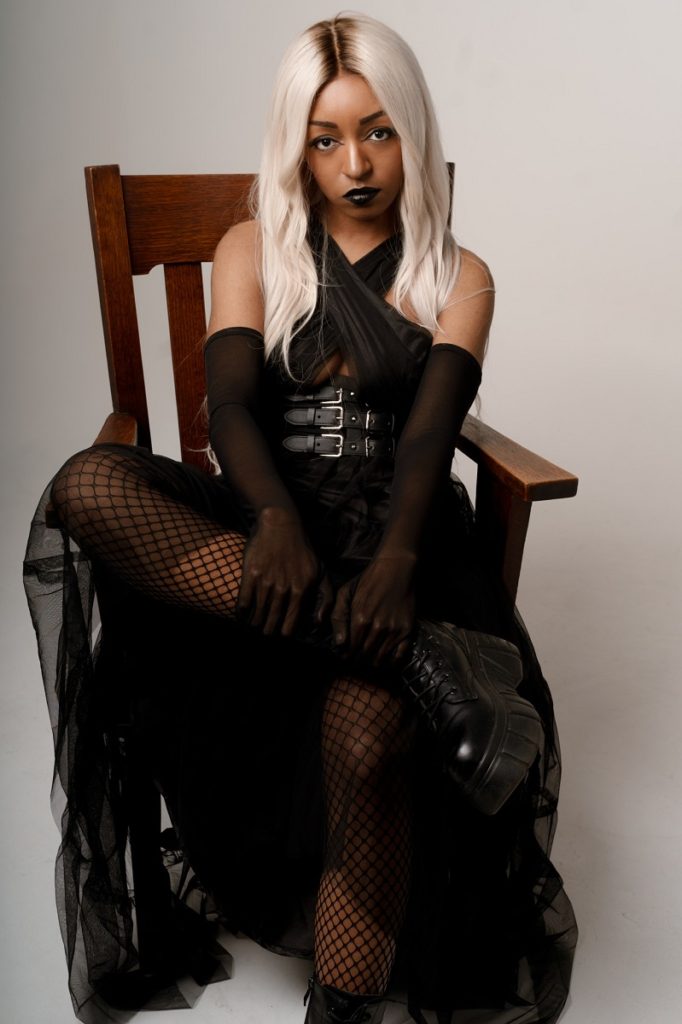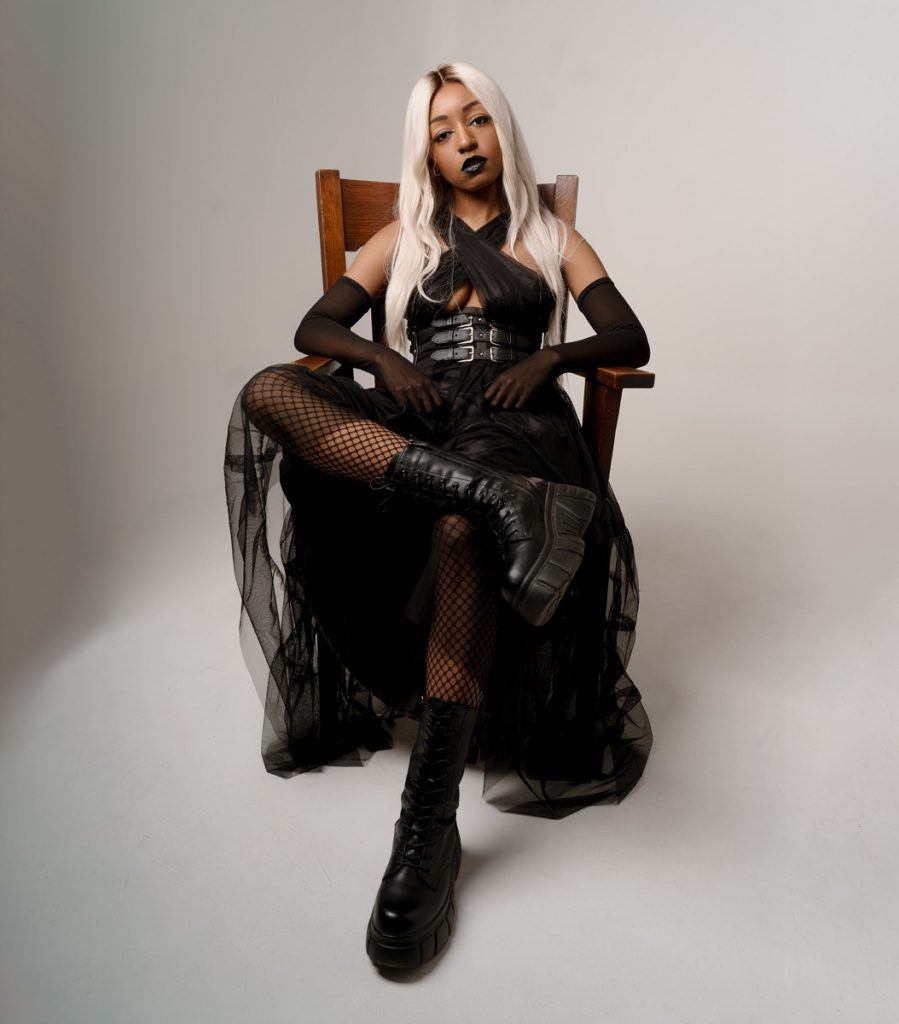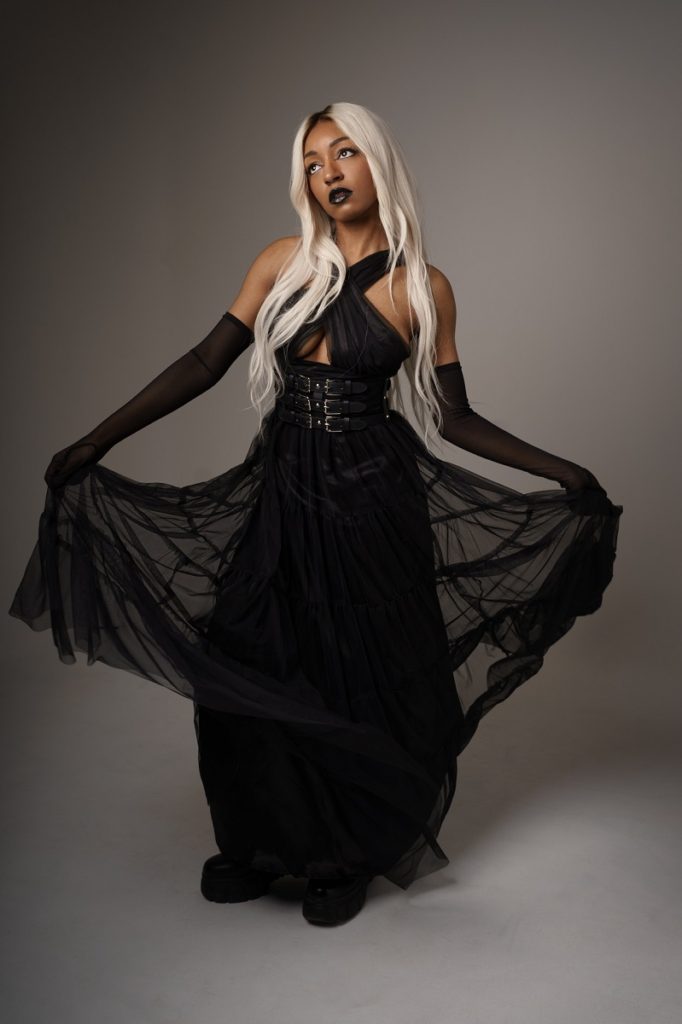Society still has quite some way to go to become truly inclusive and understanding. Indeed even the alternative community, a generally more enlightened part of the wider population, is still battling with its own inner demons. So imagine being an asexual woman of colour with a fondness for heavy metal who also happens to work as a model. It’s no small wonder Yasmin Benoit turned to campaigning to get some recognition for a much misunderstood group. She’s been so successful awards have followed. Gary Trueman chatted to Yasmin about what exactly asexuality is, her campaign work and of course her love of heavy metal.

Let’s start at the beginning for those readers that are unaware can you give a brief description of what asexual and aromantic are?
“Being asexual means not experiencing sexual attraction towards anyone regardless of their gender. Being aromantic means not experiencing romantic attraction regardless of their gender.”
You knew that you had these feeling at a young age, around 9 years old. Is that correct?
“I always realised I was asexual when everyone realised they weren’t. I didn’t discover the terminology until I was about 15.”
Do you think that’s quite common, that more people than many would realise have these feelings but don’t know what it is they are feeling?
“Yes, I mean lots of people don’t come across the word, but I was lucky to be part of a generation where it wasn’t hard to find. If you’re older then it could be a lot harder to have come across it.”
Asexuality even within the LGBTQ+ community isn’t often talked about. Why do you think that is?
“Historically the whole movement was fighting for the legalisation of queer activities, queer sex and marriage, the equalising of the age of consent and destigmatising HIV. It was always very causal and the causes were generally related to the sex you were having which didn’t really align with asexuality. So it wasn’t really included in that conversation until more recently when we’ve been able to expand it more. But even then you kind of have to start from the beginning whereas other communities have had many years to normalise these ideas.”
When did you begin campaigning yourself?
“I publically came out around 2017 on my social media. I think people took notice in 2018. And I finished my masters degree at that time as well so I could dedicate a bit more time to it.”
Obviously it’s a subject that you’re raising awareness of to the wider public but also within the umbrella of the LGBTQ+ community too. So what sort of reactions have you had by people within that community and the wider public?
“Reactions vary. Some people are pretty happy that the conversation is expanding and that they’re curious now people are talking about it or information they could access. That aspect is positive. But then you get people that don’t like things that they don’t understand or things that sound new. They are a lot more hostile towards the premise before even getting to whether they like me or not. So it can vary quite drastically. They’re either really into it or they really hate it.”
Have you had people come up to you and say they didn’t know what it was but they think they are asexual?
“Yes, that’s pretty common.”
You model and do a lot of alternative modelling. A lot of people will see the style of modelling you do, in particular lingerie, and feel that it conflicts with being asexual and aromantic because it can be viewed in a sexual way. Have you had reactions like that where people don’t understand?
“Yes, people can have a hard time understanding that you can be asexual and still put any effort at all into your appearance in general let alone being a model and modelling lingerie and doing things that people interpret as being sexual. I think you should be able to wear whatever you want. I’ve always been that kind of person so my sexuality won’t impact the way I dress. I don’t think anyone’s sexuality should impact the way they dress.”
You just want to dress in a way that you’re most comfortable with and that pleases you.
“It just so happens that my style is inspired by heavy metal, video games and professional wrestlers so I just end up looking like one of them.”

You’re a person of colour and have a love of heavy metal which has been slow to see non white people both be embraced by it and embrace it. We are now seeing more people of colour appearing within that scene both in bands and in audiences. That’s obviously a good thing. Do you think people just needed to cross a few old traditional boundaries, and that we’re seeing that reflected within the music itself?
“I think people of colour have always liked it. I’ve been listening to heavy metal since I was little. I didn’t go to a concert until I was in my 20s because I didn’t know how it was going to go. There would be nothing more heart breaking to finally step into a community and for it to go badly because of what my race is. I think now that media is a least trying to make an effort, when I look at magazines like Revolver or Kerrang or Metal Hammer, they will actually have a black person in them. Whereas when I was a teenager they would not. It was so rare. You’d hardly see girls in them.”
The original Monsters Of Rock only ever had two women perform on stage, that’s pretty shocking. But now things are more inclusive generally.
“Yeah, it’s not like we’re not in bands. At least now they’re making it look more inclusive and that means I feel I can go into this place without it going badly.”
I think Living Colour are worth a mention here as pioneers of black people playing rock and metal. But now you have so many like obviously Benji from Skindred, Skin from Skunk Anansie both of whom have been going a while. And newer breakthrough artists such as the Nova Twins and Bob Vylan, Defences too have a person of colour on vocals. It’s great to see this. It’s got to be healthier for that community hasn’t it, to be seen to be much more inclusive?
“Yeah, I think the issue is that as a teenager I could name or at least see more people talking about or engaging with national socialist black metal bands and bands that had said very openly racist things, rather than engaging with bands that had black people in them, or indeed with other minorities or women in them. You can’t censor an entire genre but if there’s a lot more of one thing than another you’re going to think it’s not a very welcoming space, not as much as people say it is. There’s more of a balance now whereas before you’d find a lot more white bands saying this isn’t for black people.”
How has your love of heavy metal influenced you directly as a person?
“I’ve always really liked guitars. And I’ve always really liked music where I could tell who wrote it and why they wrote it, and that you know who wrote it is performing it. It’s not just something that came from a giant team of people. It started off like a lot of people my age, I liked Avril Lavigne, I thought she was really cool. Then I liked Green Day and that pop punk era. Then it just got heavier. I got into Linkin Park. When I heard a scream I was just into it and wanted to hear more of these vocal styles. Then I discovered Scandinavian heavy metal and it was a done deal, like black metal and death metal. Before antone associated me with being the black asexual girl I was the black metalhead girl. Now ironically people don’t know what I listen to.”
Does the wider media still not get it though, like the tabloids. They still look like they’re lagging behind in terms of knowing how things are progressing and even just knowing about the wider alternative community and its music. They seem to label music differently so you get acts that really aren’t a part of what most in the alt community would listen to but are considered alt by mainstream standards because they don’t fit into the regulation pop spectrum either.
“I think the music industry don’t know how to interpret certain things. It has to be a very specific formula to be considered R&B, another specific formula to be pop. If you’re black and singing pop they still call it R&B because you are black. If you’re black and you’re doing rock like the Nova Twins for example they don’t know what to classify that as. That’s more for the mainstream, I think for the underground people don’t care as much so long as it sounds good.”
In 2021 you won the attitude pride award. Tell us a bit about that. And your feelings on winning it.
“That was my first award. Not just as an activist, but in life. I didn’t win anything as a kid, I wasn’t particularly good at anything. It was really cool. And I won campaigner of the year at the rainbow awards a year after that. It was cool because an asexual person has never won those kind of things before. To get that kind of recognition from places like that was really cool. To have what I do recognised as work and not just some weird thing I do sometimes was cool, especially in front of some really impressive people.”
You’re also launching the UK’s first asexual rights initiative in conjunction with Stonewall.
“Yes, we’re producing a report into asexual discrimination in the UK. So I am getting to use my degrees a little bit, not to research crime but to create my report and hopefully get data out there that’ll be useful.”
So the ultimate aim is to get legislation on the statute book that will protect asexual people who are currently discriminated against?
“Yes, because there isn’t anything like that now. There’s a really big gap there when it comes to protection, and also knowledge. Unless you have research and data then people don’t believe it’s actually happening. Stonewall have been pretty good at getting things rolling in terms of gay marriage and being able to be gay in the military. So they felt like the right people to tackle this because when that report comes out people will be inclined to pay more attention.”
Other than working with Stonewall have you got any other immediate plans?
“Once my report is out there I’d like to do more in person things. I’d like to do more writing and working more with some really cool people. And maybe do some more festivals.”
In an ‘ideal world’ what is your vision for where you hope society will go, what it will do to improve itself within the next few decades?
“I guess a place where we stop stereotyping people. I hope we’re in a place that’s so inclusive and diverse so everyone can live a lot more openly and freely. Rather than now where it’s more wow you like this? or wow you do that? or you can still do that even though you’re this? I hope we can get beyond that mentality. As a black person who’s a metalhead I always had that when I was younger. Now it’s a black person who’s asexual and is a model. Your race shouldn’t impact the music you listen to. Your sexuality shouldn’t influence the way you can dress. We should be beyond all these things, but we’re not yet. I hope we can reach a place where we are.”

Interview by Gary Trueman
Photos by Barry Gillespie Photography (@streetfacedance)


